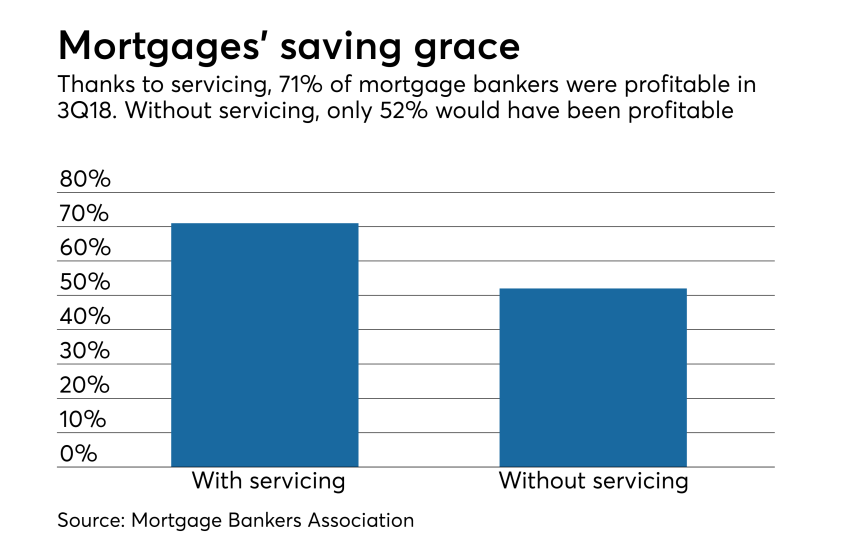
Servicing portfolio runoff could decrease and mortgage servicing rights valuations could increase in 2019 in ways that bode well for servicers, but continuing constraints on originations also could make their work more complex and expensive.

More home lenders could sell off their servicing
"There are a lot of servicing trades right now," Kevin Brungardt, CEO of RoundPoint Mortgage Servicing Corp., said in an interview. "Production is down and the refi boom is kind of over. You're seeing a lot of mortgage servicing rights portfolios trade off, and lot of monoline lenders are looking for operating liquidity."
That's likely to only intensify next year. Most forecasts call for
"Depending on whom you believe, the Fed is apt to hike two to four times over the next 12 months and the 10-year Treasury yield could go back to some kind of normalized level," said Brungardt. "Mortgage servicing rights are a very valuable asset, and you're seeing a lot of hurt and pain on the lender side of the business. But if you have a servicing position, it could be a good year."

There may be more stress on subservicers' budgets
Subservicing work might be more complicated because clients that retained historically, and are starting to sell, will only need subservicers to handle their servicing in the short-term, from after origination until it is sold.
"A transfer, depending on where you sit, may or may not be good for your business," said David Vida, executive vice president at Specialized Loan Servicing, a subsidiary of Computershare.
So can companies make money as an interim servicer?
"People need to pay you the right amount of money to board and de-board a loan. That's where automation, technology, and a smart process make a huge difference," said Vida. "It's a thin-margin business. Our challenge is how to provide a strong customer experience while spending less money."

The need to service second mortgages could grow
"Next year could be the year of home equity," said Gagan Sharma, president and CEO at BSI Financial Services. The product is more complicated for monoline servicers to handle than traditional mortgages because of the mix of short-term draws and longer-term withdrawals that may be involved.
While most servicers and subservicers are largely expecting a continuing climb in home equity business as

The economy may be overdue for a downturn
"I worry about the economy," said Sharma.
Among developments that could weaken the market's strong housing and loan performance, or lower rates, are
"I don't believe the housing market will be the cause of the next downturn, but if there is ever a downturn the housing industry will definitely be impacted," said Sharma.

Mortgage delinquency rates could bottom out
"The
So long as no unexpected development such as a significant uptick in delinquencies occurs, next year could be a relatively good one for performing servicers with strong cost controls and technology.




